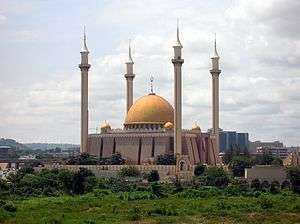Religion in Nigeria
Nigeria, the most populous African country (with a population of over 200 million in 2018),[2] is divided between adherents of Christianity, Islam and traditional religion quite similar to polytheism though the exact ratio is uncertain. The majority of Nigerian Muslims are either non-denominational Muslims or Sunni and are concentrated in mostly the northern region of the country with some Christian population, the same way Christians dominate in the south with some Muslim population. Most Nigerian Christians are Protestant (broadly defined) though about a quarter are Catholic.[3]
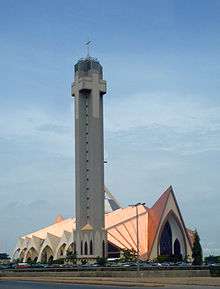
Nigeria has the largest Muslim population in sub-Saharan Africa.[4] Islam dominates the north and has a number of supporters in the southwestern, Yoruba part of the country. In terms of Nigeria's major ethnic groups' religious affiliations, the Hausa ethnic group in the north is mostly Muslim, the Yoruba tribe in the west is divided among mainly Muslim, Christian and traditional religions, while the Igbos of the east and the Ijaw in the south are predominantly Christians (Catholics) and some practitioners of traditional religions.[5] The middle belt of Nigeria contains the most of the minority ethnic groups in Nigeria and they are mostly Christians and members of traditional religions with few Muslim converts.[6][7]
The two largest affiliations among Muslims in Nigeria are non-denominational Muslims and Sunni, belonging to Maliki school of jurisprudence; however, a sizeable minority also belongs to Shafi madhhab. Many Sunni Muslims are members of Sufi brotherhoods. Most Sufis follow the Qadiriyya, Tijaniyyah or Mouride movement. A significant Shia minority exists (see Shia in Nigeria). Some northern states have incorporated Sharia law into their previously secular legal systems, which has brought about some controversy.[8] Kano State has sought to incorporate Sharia law into its constitution.[9] The majority of Quranists follow the Kalo Kato or Quraniyyun movement. There are also Ahmadiyya and Mahdiyya minorities.[10]
Survey data
According to a 2019 report[11] from The World Factbook by CIA, Muslim 51.6%, Christian 46.9%, traditionalist .9%, unspecified .5% (2013 est.). In a 2019 report released by Pew Research Center in 2015 the Muslim population was estimated to be 50% while the Christian population was estimated to be 48.1%.[12] The Pew Forum in a 2010 report compared reports from several sources.[13] The 1963 Nigerian census found that 47% of the population was Muslim, 34% Christian, and 18% other.[14] The 2008 MEASURE Demographic and Health Survey (DHS) found 53% Muslim, 45% Christian, and 2% other; the 2008 Afrobarometer poll found 49% Christian, 50% Muslim, and 1% other; Pew's own survey found 52% Muslim, 46% Christian, and 1% other.[13][3][15]
Abrahamic religions
Islam
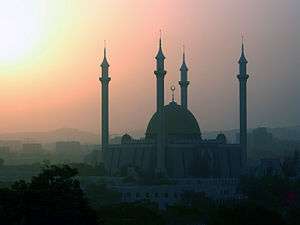
Nigeria has one of the largest Muslim populations in West Africa.[16] Islam was introduced to northern Nigeria as early as the 11th century and was well established in the major capitals of the region by the 16th century, spreading into the countryside and toward the Middle Belt uplands. Shehu Usman dan Fodio established a government in Northern Nigeria based on Islam before the advent of colonialism. The British colonial government therefore established indirect rule in Northern Nigeria based on the structure of this government. Islam also came to South Western Yoruba-speaking areas during the time of Mansa Musa's Mali Empire.[17]
The vast majority of Muslims in Nigeria are Sunni belonging to Maliki school of jurisprudence; however, a sizeable minority also belongs to Shafi madhhab. Many Sunni Muslims are members of Sufi brotherhoods. Most Sufis follow the Qadiriyya, Tijaniyyah or Mouride movement. Nigerian Islam has become heterogenous with the springing up of many Islamic sects. Notable examples are the Izala movement,[18][19] the Shia movement, and many local Islamic sects that have limited expansion.
Shia
The Shia Muslims of Nigeria are primarily located in the Sokoto State.[20][21] Shia Muslims make up between two and four million of Nigeria's population.[22][23] Ibrahim Zakzaky introduced many Nigerians to Shia Islam.
Sufi
Some Nigerian Muslims emphasize asceticism and mysticism and usually form groups called "tariqas", "Sufi orders" or "Sufi brotherhoods". They always preach peaceful co-existence and had no empathy for radical Islam. Most Sufis follow the Qadiriyya, Tijaniyyah or Mouride movement.
Ahmadiyya
The Ahmadiyya movement established itself in Nigeria in 1916,[24] and make up approximately 3% of the Muslim population.[25] There are numerous Ahmadiyya centres in Nigeria including the Baitur-Raheem Mosque in Ibadan inaugurated in 2008,[26] the Mubarak Mosque in Abuja, which is the last Ahmadiyya mosque, built in the first century of the Ahmadiyya Caliphate.[27] Ahmadiyyas have also established a weekly newspaper called "The Truth" which is the first Muslim newspaper in the country.[28]
Quraniyoon
The Kala Kato are a Nigerian group of Quranists. Their name means "a mere man said it" referring to the narrators of the sayings of Muhammad. The Kalo Kato rely entirely on the Quran and they are found among poor communities across northern Nigeria.[10]
Boko Haram and Darul Islam
Islam in Nigeria has witnessed a rise in the numbers of Islamic extremism notably among them, the Boko Haram, Maitatsine, Darul Islam[29][30] among others.
These sects have sometimes resorted to the use of violence in a bid to realizing their ambitions on the wider Islamic and Nigerian populations as a whole.[31]
The rise of this radical movements has been attributed partly to the poor socio economic infrastructures and poor governance in Nigeria.[32] Poverty has been seen as the major catalyst leading to the rapid increase in the membership of these religious extremist groups.[33] The rise of these sects has also been linked to the increase and aiding of religious extremist by politicians for their selfish ambitions.
During the 1980s religious riots occurred in and around the five cities of Kano in 1980, Kaduna in 1982, Bulum-Ketu in 1982, Jimeta in 1984 and Gombe in 1985. These riots were caused by the migration of the rural poor into urban towns during the dry seasons. An offshoot of Islam called the ‘Yan Tatsine’ violently rebelled against the authorities and non-members. These radical Muslims were inspired by Alhaji Mohammed Marwa Maitatsine. He was a Cameroon preacher who slated the government, something which led to his arrest in Nigeria in 1975, yet by 1972 many people followed him across society, ranging from the elite to Koranic students called almajiral or gardawa and unemployed migrants. Maitatsine and his followers became separate from orthodox Islam, condemning the corruption of the religious and secular elites and the wealthy upper classes’ consumption of Western goods during the petrol boom in 1974–81.[34] The Boko Haram movement has been connected to the Maitatsine movement. They want to implement sharia law across the whole of Nigeria.[35]
Christianity
| Christian denominations in Nigeria |
|---|
|
African initiated
Presbyterian and Reformed
Other Protestant
|
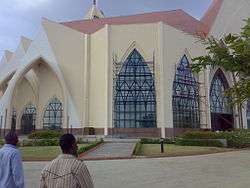
Nigeria has the largest Christian population in Africa though Christians are about 48% of the population.[36] According to a 2011 Pew report, over 80 million Nigerians are Christians. Among Christians, about a quarter are Catholic, three quarters are Protestant, and about 750,000 belong to other Christian denominations and a few of them are Orthodox Christians.[37][38]
The leading Protestant churches in the country are the Church of Nigeria of the Anglican Communion, The African Church, the Assemblies of God Church, the Nigerian Baptist Convention (NBC) and The Synagogue, Church Of All Nations (SCOAN). The Yoruba area contains a large Anglican population, while Igboland is predominantly Catholic and the Edo area is predominantly Assemblies of God, which was introduced into Nigeria by Augustus Ehurie Wogu and his associates at Old Umuahia.
The Nigerian Baptist Convention claims about three million baptized members.[39]
From the 1990s to the 2000s, there was significant growth in Protestant churches, including the Redeemed Christian Church of God (RCCG), Living Faith Church (Winners' Chapel), Christ Apostolic Church (CAC) (the first Aladura Movement in Nigeria), Deeper Christian Life Ministry, Evangelical Church Winning All (ECWA), Mountain of Fire and Miracles (MFM), Christ Embassy, Common Wealth of Zion Assembly (COZA), Aladura Church[40] (indigenous Christian churches being especially strong in the Yoruba and Igbo areas), and of evangelical churches in general. These churches have spilled over into adjacent and southern areas of the middle belt. Denominations like the Seventh-day Adventist also exist.[41]
There are over 300,000 Early Pentecostal Apostolic Churches parishes in Nigeria having about 4.2 million adherents. Such denominations in this group are:
- The Christ Apostolic Church,
- The Apostolic Church,
- The Celestial Church,
- The Cherubim and Seraphim Church et cetera.
There are also about 380,000 New Apostolic Church parishes constituting about 6.5 million believers|New Apostolic Christians in Nigeria include: 1) The Redeemed Church, 4) Deeper Life Church, 5) Overcomers' Ministries and other new springs. Bye and large, Protestantism particularly the Pentecostals, Apostolic and evangelicals constitute the major Christian population of Nigeria from the late 1990s to the present.
The Church of Jesus Christ of Latter-Day Saints (LDS) announced creation of new Owerri mission in Nigeria in 2016.[42]
Roman Catholicism
The Archdioceses of the Roman Catholic Church are: Abuja, Onitsha, Benin City, Calabar, Ibadan, Lagos, and Owerri.[43] It has about 19 million members in Nigeria in 2005.[44] Cardinal Francis Arinze is a Roman Catholic Cardinal from Nigeria.[45]
Anglicanism
The ecclesiastical provinces of the Church of Nigeria are:
Lagos, Ibadan, Ondo, Bendel, The Niger, Niger Delta, Owerri, Abuja, Kaduna and Jos.[46] Its primate is Nicholas Okoh.[46] The Church of Nigeria has about 17 million members.[47]
Christian distribution
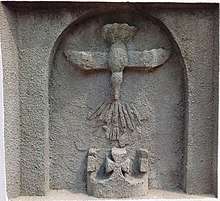
The majority of Christians are found in the south east, South-South, south west and Middle-belt region.[48] An increasing number of mission stations and mission bookstores, along with churches serving southern enclaves and northern Christians in the northern cities and larger towns, are found in the Muslim north. Christianity in Yoruba area traditionally has been Protestant and Anglican, currently Protestant Pentecostal/evangelicals, whereas Igboland has always been the area of greatest activity by the Roman Catholic Church with current infusions of Protestantism. Other denominations abounded as well.
Presbyterians arrived in the late 17th century in the Ibibio, Annang and Efik land and the Niger Delta area and had missions in the middle belt as well. The works of the Presbyterian Church in Calabar from Scotland by missionaries like Rev Hope M. Waddell, who arrived in Calabar 10 April 1846, in the 19th century and that of Mary Slessor of Calabar are examples. Small missionary movements were allowed to start up, generally in the 1920s, after the middle belt was considered pacified. Each denomination set up rural networks by providing schooling and health facilities. Most such facilities remained in 1990, although in many cases schools had been taken over by the local state government in order to standardize curricula and indigenize the teaching staff .
Pentecostals arrived mostly as indigenous workers in the post-independence period, and in the 1980s, Evangelical and Apostolic Pentecostalism were spreading rapidly throughout the south western and middle belt, having major success in hitherto Roman Catholic and Protestant towns of the south as well . There were also breakaway, or Africanized churches, that blended traditional Christian symbols with indigenous symbols. Among these was the Aladura (prayer) movement that was spreading rapidly throughout Yoruba land and into the non-Muslim middle belt areas.
Missionary work
Apart from Benin and Warri, which had come in contact with Christianity through the Portuguese as early as the 15th century, most missionaries arrived by sea in the 19th century. As with other areas in African continent, Roman Catholics and Anglicans each tended to establish areas of hegemony in southern Nigeria. After World War I, smaller denominations such as the Church of the Brethren (as Ekklesiyar Yan'uwa a Nigeria), Seventh-day Adventists and others worked in interstitial areas, trying not to compete. Although less well-known, African-American churches entered the missionary field in the 19th century and created contacts with Nigeria that lasted well into the colonial period. Also, during this period, Jehovah's Witnesses began their missionary work in Nigeria and soon spread throughout the country[49]
Offshoots of European denominations
African churches were founded by small groups breaking off from the European denominations, especially in Yorubaland, where such independence movements started as early as the early 19th century—influenced by American and British missionaries in early 1900s and stimulated by the great revival of the 1930s. They were for the most part ritually and doctrinally identical to the parent church, although more African music, and later dance and dressage/vesture, entered and mixed with the imported church services. Notable among the new springs of 1930 were such Protestant Pentecostals as the Christ Apostolic Church—an offshoot of US-based Faith Tabernacle which swept through the Western Region and complemented by the likes of the Celestial Church and the Cherubim and Seraphim Church which were indigenous autonomous springs. A number of indigenous denominations used Biblical references to support polygamy.
With political independence came African priests in both Roman Catholic and Protestant denominations. Rituals and forms of worship were strictly those of the home country of the original missionaries. By the 1980s, African music and even dancing were being introduced quietly into western oriented church services, albeit altered to fit into rituals of Euro-American origin. Southern Christians living in the north, especially in larger cities, had congregations and churches founded as early as the 1920s.
Even medium-sized towns (20,000 persons or more) with an established southern enclave had local churches, especially in the middle belt, where both major religions had a strong foothold. The exodus of Igbo from the north in the late 1960s left Roman Catholic churches poorly attended. By the 1980s adherents were back in even greater numbers, and a number of new churches had been built. The middle belt and the west and southwest of Nigeria remain the hold of Protestants (Pentecostal, evangelical and indigenous spring of Christian denominations).
Combination with traditional practices
The Aladura, like several other breakaway churches, stress healing and fulfillment of life goals for oneself and one's family. African beliefs that sorcery and witchcraft are malevolent forces against which protection is required are accepted; rituals are warm and emotional, stressing personal involvement and acceptance of spirit possession. Theology is biblical, but some sects add costumed processions and some accept polygyny.
Social class and religion
Major congregations of the larger Anglican and Roman Catholic missions represented elite families of their respective areas, although each of these churches had members from all levels and many quite humble church buildings. Nevertheless, a wedding in the Anglican cathedral in Lagos was usually a gathering of the elite of the entire country, and of Lagos and Yorubaland in particular. Such families had connections to their churches going back to the 19th century and were generally not attracted to the breakaway churches. All major urban centers, all universities, and the new capital of Abuja had areas set aside for the major religions to build churches and mosques and for burial grounds.
Bahá'í Faith
After an isolated presence in the late 1920s,[50] the Bahá'í Faith in Nigeria begins with pioneering Bahá'ís coming to Sub-Saharan West Africa in the 1950s especially following the efforts of Enoch Olinga who directly and indirectly affected the growth of the religion in Nigeria.[51] Following growth across West Africa a regional National Spiritual Assembly was elected in 1956.[52] As the community multiplied across cities and became diverse in its engagements it elected its own National Spiritual Assembly by 1979[53] and Operation World estimated 1000 Bahá'ís in 2001[54] though the Association of Religion Data Archives (relying mostly on the World Christian Encyclopedia) estimated some 34,000 Bahá'ís in 2005.[55]
Traditional beliefs
Alongside the main religious sect is the traditional belief system that without contradicting civil law manages to also govern ethics and morality amongst much of the population.
Traditional religion among the Yorubas
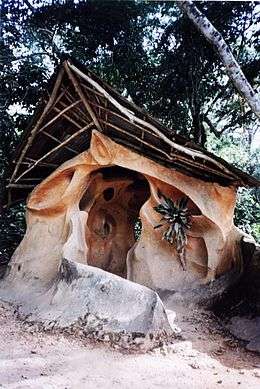
Within the city and states of Yorubaland as well as its neighbors, a more reserved way of life expresses a theology that links local beliefs to a centrally placed government and its sovereignty over the neighbourhood or communities through the monarch, the king. The seat of the king (oba) is chiefly responsible for the welfare of its subjects, as a confirmation of the legitimacy of the oba's (king) rule over his subjects.
Practices
In addition to ensuring access to, and the continual fertility of, both land and people, seasonal carnivals act as a spectacle for "tourism" contributing to regional productivity. Meanwhile, the practices are not the same; they have some similarities and differences. The acts in a given traditional carnival is dependent on the type of gods or goddesses to be worshiped. While tradiional carnivals usually attracts tourists, fun seekers, and community people, it is also good to note that there certain forbidden acts which prevent people from doing cerain things, probably before and during the carnivals.
"Society in general has more gradually and selectively expanded to accommodate new influences, it is fairly certain that they will continue to assert their distinctive cultural identity in creative and often ingenious ways".[56]
Inter-religious conflict
In the 1980s, serious outbreaks between Christians and Muslims occurred in Kafanchan in southern Kaduna State in a border area between the two religions, propagated by extreme leaders who were able to rally a young, educated group of individuals who feared that the nation would not be able to protect their religious group.[57] The leaders were able to polarize their followers through speeches and public demonstrations.[58]
The activities of some of these sects has in recent times led to the loss of lives and properties as they move about destroying government facilities which they see as legacies or replica of western cultures in their various communities. These religious campaigns have seen an increase in gun battles between the members of these sects and security forces with loss of lives witnessed on both sides.[59] Although direct conflicts between Christians and Muslims were rare, tensions did flare between the two groups as each group radicalised. There were clashes in October 1982 when Muslim zealots in Kano were able to enforce their power in order to keep the Anglican House Church from expanding its size and power base as they saw it as a threat to the nearby Mosque, even though the Anglican House Church had been there forty years prior to the building of the Mosque.[60]
Additionally, there were two student groups in Nigeria who came into contestation, the Fellowship of Christian Students and the Muslim Student Society. In one instance there was an evangelical campaign organised by the FCS and brought into question why one sect should dominate the campus of the Kafanchan college of education. This quarrel accelerated to the point where the Muslim students organised protests around the city and culminated in the burning of a Mosque at the college. The Christian majority at the college retaliated on March 9 when 12 people died and several Mosques were burnt and a climate of fear brews. The retaliation was pre-planned.[61]
Exploitation of the media used to propagate the ideas of the conflict, thereby radicalising each force even more. Media was biased on each side so while places like the federal radio corporation discussed the idea of defending Islam during this brief moment of terror but does not report the deaths and damage caused by Muslims, galvanising the Muslim population. Similarly, the Christian papers did not report the damage and deaths caused by Christians but focused on the Islamic terror.[62] Other individuals leading these religious movements use the media to spread messages which gradually became more intolerant of other religions.[63]
Atheism
Irreligion in Nigeria is measured at less than one percent of the population.[64] As in many parts of Africa, there is a great amount of stigma attached to being an atheist.[65][66][67][68][69][70][71][72]
A 2010 poll by Pew Research Center showed that 51% of Nigerian Muslims agree with the death penalty for leaving Islam.[73] In some parts of Nigeria, there are even anti-blasphemy laws.[74]
In 2017 the Humanist Association of Nigeria gained formal government recognition after a 17-year struggle.[75] This was followed by recognition of the Atheist Society of Nigeria, the Northern Nigerian Humanist Association and the Nigerian Secular Society.[76]Other religions
Hinduism
Hinduism spread to Nigeria mainly by immigration of Hindus from India and of Hare Krishna Missionaries. Many Nigerians have converted to Hinduism mainly due to efforts of ISKCON Missionaries. ISKCON has inaugurated the Vedic Welfare Complex in Apapa.[77]
Altogether including Nigerians of Indian origin and NRIs there are 25,0000 Hindus in Nigeria. Most of them live in Lagos, the former capital of Nigeria
Chrislam
Chrislam is a blend of Christianity and Islam that takes practices from both the Bible and the Quran. It hopes to quell religious feuds among Nigerians.[78]
The Grail Movement
Nigeria has become an African hub for the Grail Movement, inspired by the work of Abd-ru-shin, principally In the Light of Truth: The Grail Message.[79]
The Grail Movement is not an organisation in the usual legal sense, but a collective term for all kinds of endeavours to spread the knowledge of the Grail Message and to utilise it in all walks of life.
The associating of adherents of the Grail Message creates the foundation and the outer setting for the holding of hours for the joint worship of God (Hours of Worship) and Grail Festivals.
Facilitating such hours for adherents and readers of the Grail Message is - besides the dissemination of the Grail Message - one of the main concerns of the international Grail Movement[80]. The ideative field of activity with its Hours of Worship and Grail Festivals, lecture events, readings, discussion evenings, seminars, events for children and young people, art exhibitions, concerts and more besides, comprises the actual activity of the Movement.
The Reformed Ogboni Fraternity
A fraternity incorporating references and insignia from the original Ogboni, is based on ancient rites, usages and customs. Established in 1914 by the Ven. Archdeacon T. A. J. Ogunbiyi. Membership is open to all adults who embrace a non-idolatrous faith in God. The fraternity is headquartered in Lagos, Nigeria. In 1996 it had about 710 conclaves/Lodges or Iledi in Nigeria and overseas.[81]
By state
- Religion in Abia State
- Religion in Adamawa State
- Religion in Akwa Ibom State
- Religion in Anambra State
- Religion in Bauchi State
- Religion in Bayelsa State
- Religion in Benue State
- Religion in Borno State
- Religion in Cross River State
- Religion in Delta State
- Religion in Ebonyi State
- Religion in Edo State
- Religion in Ekiti State
- Religion in Enugu State
- Religion in Gombe State
- Religion in Imo State
- Religion in Jigawa State
- Religion in Kaduna State
- Religion in Kano State
- Religion in Katsina State
- Religion in Kebbi State
- Religion in Kogi State
- Religion in Kwara State
- Religion in Lagos State
- Religion in Nassarawa State
- Religion in Niger State
- Religion in Ogun State
- Religion in Ondo State
- Religion in Oyo State
- Religion in Plateau State
- Religion in Rivers State
- Religion in Sokoto State
- Religion in Taraba State
- Religion in Yobe State
- Religion in Zamfara State
- Religion in Akwa Ibom State
- Religion in Federal Capital Territory (FCT) State
References
![]()
- "Abuja City". Federal Capital Territory website. Federal Capital Territory. Archived from the original on 24 July 2007. Retrieved 9 August 2007.
- World Population Prospectus: The 2015 Revision (PDF). Department of Economic and Social Affairs , United Nations. 2015. p. 21. Retrieved 13 September 2015.
- "Global Christianity: A Report on the Size and Distribution of the World's Christian Population" (PDF). Retrieved 3 February 2015.
- "The countries with the 10 largest Christian populations and the 10 largest Muslim populations". Pew Research Center. Retrieved 24 May 2020.
- "Nigeria: a secular or multi religious state - 2". Archived from the original on 6 March 2014. Retrieved 15 April 2014.
- "The Middle Belt: History and politics". Nasarawastate.org. 29 November 2004. Archived from the original on 29 February 2012. Retrieved 13 March 2012.
- http://www.britannica.com/bps/additionalcontent/18/26525030/The-Middle-Belt-Movement-and-the-Formation-of-Christian-Consciousness-in-Colonial-Northern-Nigeria
- Owobi Angrew, Tiptoeing Through A Constitutional Minefield: The Great Sharia Controversy in Nigeria, Journal of African Law, Vol 48, No 2, 2002.
- "Kano Seeks Supremacy of Sharia Over Constitution". wwrn.org. 17 March 2005. Retrieved 7 June 2011.
- "Diversity in Nigerian Islam" (PDF). Retrieved 15 April 2014.
- Feb 2019 CIA Nigeria One Page Summary
- "The countries with the 10 largest Christian populations and the 10 largest Muslim populations".
- Islam and Christianity in Sub-Saharan Africa: Appendix B (PDF). Pew Forum. 2010. p. 3. Retrieved 13 September 2015.. Pew's own survey info contradicts other Pew reports so there may be an error
- "https://www.qeh.ox.ac.uk/sites/www.odid.ox.ac.uk/files/BP1Ostien.pdf" (PDF). External link in
|title=(help) - "Future of the World Muslim Population" (web). 27 January 2011. Retrieved 3 February 2015.
- "Mapping The Global Muslim Population, October 2009" (PDF). Archived from the original (PDF) on 10 March 2012. Retrieved 13 March 2012.
- Ottuh, POO; Ottuh, JA; Aitufe, VO (13 June 2014). "Christian – Muslim Relations in Nigeria: The Problems and Prospects". AFRREV IJAH: An International Journal of Arts and Humanities. 3 (2): 46. doi:10.4314/ijah.v3i2.4. ISSN 2227-5452.
- nigerian Izala movement Archived 8 June 2011 at the Wayback Machine
- "Islam Nigeria". Sharia-in-africa.net. Retrieved 13 March 2012.
- "Nigerian Shia base knocked down". BBC News. 1 August 2007. Retrieved 22 May 2010.
- "Attack on Shi'as in Nigeria | Jafariya News Network". Jafariyanews.com. 30 July 2007. Retrieved 13 March 2012.
- Miller, Tracy, ed. (October 2009). Mapping the Global Muslim Population: A Report on the Size and Distribution of the World's Muslim Population (PDF). Pew Research Center. Archived from the original (PDF) on 10 October 2009. Retrieved 8 October 2009.
- Nigeria: 'No Settlement With Iran Yet', Paul Ohia, allAfrica - This Day, 16 November 2010.
- Ahmadiyya Muslim Mosques Around the World, p. 95
- "The World's Muslims: Unity and Diversity" (PDF). Pew Forum on Religious & Public life. 9 August 2012. Retrieved 2 June 2014.
- http://www.alislam.org report of Khalifatul Masih V’s West African tour
- Ahmadiyya Muslim Mosques Around the World, p. 34
- Ahmadiyya Muslim Mosques Around the World, p. 99
- "Niger begins demolition of sect's enclave". Nigeria70.com. 2 September 2009. Retrieved 13 March 2012.
- "Darul-Islam: Rise and fall of an empire". Thenationonlineng.net. Archived from the original on 9 May 2012. Retrieved 13 March 2012.
- Egodi Uchendu. "Radical Islam in the Lake Chad Basin, 1805-2009: From the Jihad to Boko Haram". Egodiuchendu.com. Archived from the original on 15 August 2011. Retrieved 13 March 2012.
- "Islamic Fundamentalism and Sectarian Violence: The "Maitatsine" and "Boko Haram" Crises in Northern Nigeria" (PDF). Archived from the original (PDF) on 26 July 2011. Retrieved 27 August 2011.
- Borno bolsters security after attacks Archived 16 October 2010 at the Wayback Machine
- Paul M. Lubeck, "Islamic Protest under Semi-Capitalism: ‘ Yan Tatsine Explained", Africa: Journal of the International African Institute, 55.4, (1985) 369-389, pp. 369–370
- Toni Johnson, "Boko Haram", Council on Foreign Relations, 31 August 2011, < http://www.cfr.org/africa/boko-haram/p25739> [accessed on 1/11/2011]
- Ojo, Matthews A. (July 1995). "The Charismatic Movement in Nigeria Today". International Bulletin of Missionary Research. 19 (3): 114–118. doi:10.1177/239693939501900306. ISSN 0272-6122.
- "Regional Distribution of Christians". Pew Research Center's Religion & Public Life Project. 19 December 2011. Retrieved 27 October 2016.
- "Nigeria". CIA World Factbook. Retrieved 18 July 2019.
- "Site of the Nigerian Baptist Convention". Archived from the original on 27 July 2011.
- Ray, Benjamin C. (1993). "Aladura Christianity: A Yoruba Religion". Journal of Religion in Africa. 23 (3): 266–291. doi:10.1163/157006693X00148. JSTOR 1581109.
- Hackett, Rosalind I. J. (1 January 1988). "The Academic Study of Religion in Nigeria". Religion. 18 (1): 37–46. doi:10.1016/S0048-721X(88)80017-4. ISSN 0048-721X.
- "Mormon Church announces in missions in Vietnam and Africa".
- "Current Dioceses in Nigeria (Catholic Hierarchy)".
- Timberg, Craig (17 April 2005). "Washington Post". The Washington Post. Retrieved 22 May 2010.
- Carroll, Rory (3 October 2003). "The Guardian on Arinze". London. Retrieved 22 May 2010.
- "Site of the Church of Nigeria". Archived from the original on 10 January 2011.
- "Site of the Gazette ( Colorado Springs)". Archived from the original on 2 January 2013.
- Refugees, United Nations High Commissioner for. "Refworld | Nigeria: Situation of Christians, including those living in northern cities, Lagos and Abuja; state protection (2011-October 2015)". Refworld. Retrieved 24 May 2020.
- https://wol.jw.org/en/wol/library/r1/lp-e/all-publications/books/yearbooks/yearbook-1986
- Universal House of Justice; prepared under the supervision of the Universal House of Justice. (1986). In Memoriam. The Bahá'í World. XVIII. Bahá'í World Centre. pp. Table of Contents and pp.619, 632, 802–4. ISBN 978-0-85398-234-0.
- Mughrab, Jan (2004). "Jubilee Celebration in Cameroon" (PDF). Bahá'í Journal of the Bahá'í Community of the United Kingdom of Great Britain and Northern Ireland. 20 (5).
- Compiled by Hands of the Cause Residing in the Holy Land. "The Bahá'í Faith: 1844-1963: Information Statistical and Comparative, Including the Achievements of the Ten Year International Bahá'í Teaching & Consolidation Plan 1953-1963". pp. 22, 46.
- MacEoin, Denis; William Collins. "Children/education (Listings)". The Babi and Baha'i Religions: An Annotated Bibliography. Greenwood Press's ongoing series of Bibliographies and Indexes in Religious Studies. pp. see entries 60–63, 80, 139. Retrieved 26 March 2008.
- "Republic of Niger for August 29". Operation World. Paternoster Lifestyle. 2001. Archived from the original on 22 March 2008. Retrieved 18 May 2008.
- "Most Baha'i Nations (2005)". QuickLists > Compare Nations > Religions >. The Association of Religion Data Archives. 2005. Retrieved 4 July 2009.
- "(Publications):The Texture of Change". Cultural Survival. Retrieved 13 March 2012.
- Jibrin Ibrahim, "Politics of religion in Nigeria: The Parameters of the 1987 Crisis in Kadana State", Review of African Political Economy, 45 (1989), 65-82. pp. 65–68 < https://www.jstor.org/stable/4006011> [accessed on 01/11/2011]
- Ibrahim, p. 65
- "Understanding Boko Haram – A Theology of Chaos: by Chris Ngwodo". Nigeriaplus.com. 6 October 2010. Archived from the original on 13 March 2012. Retrieved 13 March 2012.
- Ibrahim, pp. 65-66
- Ibrahim, pp. 66–68
- Ibrahim, pp. 67–70
- Ibrahim, p. 72
- "Global Index of Religiosity and Atheism" (PDF). Gallup. Archived from the original (PDF) on 24 May 2013. Retrieved 25 July 2012.
- Igwe, Leo (13 September 2012). "Atheism in Nigeria". Sahara Reporters. Retrieved 25 July 2013.
- "No country for Nigerian 'unbelievers'". The Punch. Archived from the original on 17 December 2013. Retrieved 17 December 2013.
- Buari, Jasmine (23 August 2016). "Do you know the pain of being an atheist in Nigeria? – Unbelievers cry out". Retrieved 10 July 2017.
- Igwe, Leo. "Atheism in Nigeria: Challenges and Opportunities - Modern Ghana". Retrieved 10 July 2017.
- "What if Zuckerberg were a Nigerian atheist?". Retrieved 10 July 2017.
- "Nigeria Must Remain Neutral When It Comes To Religion". Retrieved 10 July 2017.
- "Is it harder to "come out" as an atheist if you're black?". www.newstatesman.com. Retrieved 10 July 2017.
- "TRUE Africa - How social media is helping atheists survive in one of the most religious places on earth". 13 April 2016. Retrieved 10 July 2017.
- "Muslim Publics Divided on Hamas and Hezbollah" (PDF). Pewglobal.org. Archived from the original (PDF) on 14 December 2010. Retrieved 28 September 2013.
- "Laws Penalizing Blasphemy, Apostasy and Defamation of Religion are Widespread | Pew Research Center's Religion & Public Life Project". Pewforum.org. 21 November 2012. Retrieved 28 September 2013.
- "Humanist Association of Nigeria achieves formal recognition after 17-year campaign". Humanists International. 11 December 2017. Retrieved 27 July 2019.
- Oduah, Chika (18 September 2018). "Nigeria's undercover atheists: In their words". www.aljazeera.com. Retrieved 27 July 2019.
- "Adherents by Location", Adherents.com, Accessed 19 May 2007.
- "In African, Islam and Christianity are growing - and blending", csmonitor.com, Accessed 19 May 2007.
- "Grail Movement - Nigeria" Archived 10 October 2007 at the Wayback Machine, grailmovementnigeria.org, Accessed 19 May 2007.
- BERNHARDT, Oskar Ernst, called Abdrushin. (1954-). In the Light of Truth. The Grail Message by Abd-ru-shin. Vomperberg; printed in Germany. OCLC 557200304. Check date values in:
|date=(help)CS1 maint: multiple names: authors list (link) - Archived 30 September 2007 at the Wayback Machine
